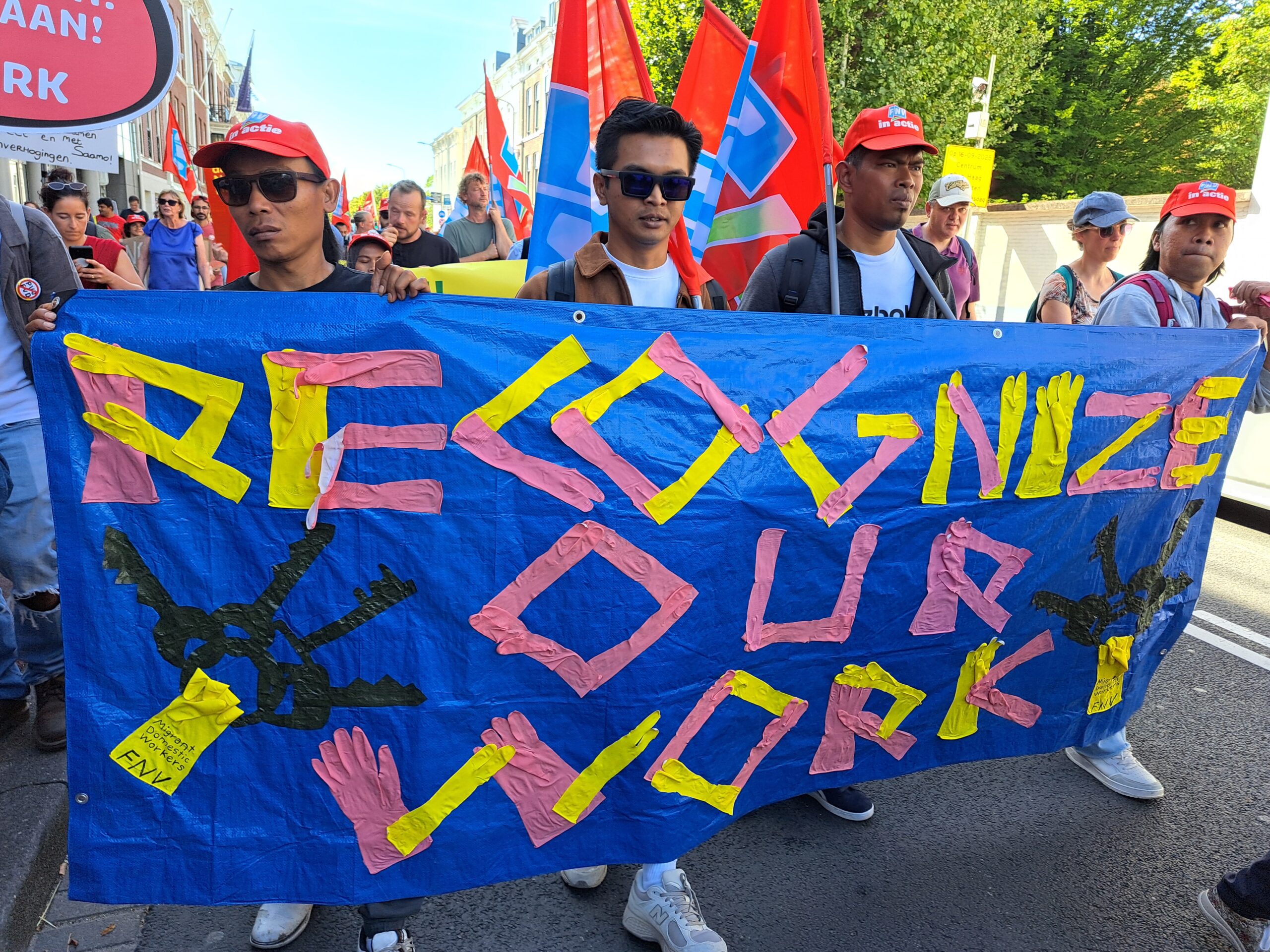
09 Sep Regularization is a better choice. Stop criminalizing people without residence permits
By Tesseltje de Lange*
[At this link, you can find the Dutch version of this article]
Criminalizing migrants does not work. It is unenforceable, encourages exploitation, and causes insecurity. That was the central message of the protest on September 7, 2025,at the Malieveld in The Hague, organized by the FNV Migrant Domestic Workers.
I was asked what does work.
Research shows that criminalizing their stay makes workers—such as the undocumented cleaners who were present in large Numbers at the demonstration—vulnerable to complain and claim their rights. In my contribution to the demonstration, I emphasized the following points.
As workers, we are all equal.
Rights that all workers in the Netherlands have:
- the right to equal and safe working conditions,
- the right to protection against dismissal, and
- the right to humane treatment.
It doesn’t matter what your residence status is: EU migrant worker, highly skilled migrant, international student, asylum seeker, Ukrainian – third-country nationals from Ukraine were also well represented – and undocumented migrants.
The Netherlands has a duty to guarantee the human dignity of everyone. It is not right for the government to criminalize and exclude part of our population. People who cannot or dare not leave, who perform essential work: it is not right for the government to deny those who are here the chance of a future, family reunification, housing: build campuses, not camps!
We know from our research that regularization and legal migration routes must be fought for.
- Regularization does work: less fear of being fired or of being reported to the immigration police for demanding decent employment conditions and working conditions.
- Legal migration pathways do work: less risk of exploitation and a clear duty of care for employers who are accountable for this.
I call on the Dutch Labor Inspectorate to support our plea for regularization and legal migration pathways. Labor Inspectorate, do justice to your task as laid down in the rules of the International Labor Organization (ILO Convention 81): do not be guided by an inhumane immigration policy, be guided by your task as protector of the rights of workers.
I call on employers to support our plea for regularization and legal migration routes.
Employers, speak up for the people in your kitchen, for the people who clean your gym, for the people who pick up your children from school. Employers, you should demand a
transparent and legal residence status so that you can be good employers to the people you need.
Our research shows that workers without residence permits want to pay taxes and social security contributions.
They – the people who gathered at this demonstration in The Hague on September 7, 2025 – want to contribute to this society, to a society they already make an indispensable contribution too. They have so far remained invisible.
I call on politicians to vote against the Emergency Asylum Act and to vote against criminalization and in favour or regularization and legal migration routes.
That is better for getting a “grip” on the situation, better for everyone’s safety, better for the treasury, better for society.
Hope. I hope that we will then have less to be ashamed of how badly migrants – with and without permits – are sometimes treated here.
I hope for Dignity For Irregularized Migrants: DignityFIRM. And together with our research partners in the I-Claim project, we say “I CLAIM DIGNITY.”
I will conclude. Regularization and legal migration pathways are good for the Netherlands and good for hardworking people without residence permits.
A dignified labour market policy and a dignified migration policy is in all our interests.
Want to read more on the research referenced?
Berntsen, L.E., Robledo, N. & Lange, T. de (2023). “ Structureel, maar ondergewaardeerd werk. Ervaringen van migranten zonder verblijfsvergunning tijdens de coronapandemie in Nederland ”. In: T. de Lange & A.G.M. Böcker (Eds.), Migranten in de frontlinie. De effecten van COVID-19 maatregelen op arbeidsmigranten
werkzaam in cruciale sectoren (pp. 315-341). Nijmegen: Centrum voor Migratierecht [English language chapter forthcoming]
Berntsen, L., Lange, T. de & Rijken, C.(2022). Migranten zonder verblijfsverunning. Rechten en sociaaleconomische positie in Nederland. Amsterdam: Amsterdam University Press
PICUM, Guide-to-undocumented-workers-rights-EN.pdf
www.dignityfirm.eu
www.i-claim.eu
*contact:
Tesseltje.delange@ru.nl
Tesseltje de Lange is Professor of European Migration Law at Radboud University and coordinates the DignityFIRM project.